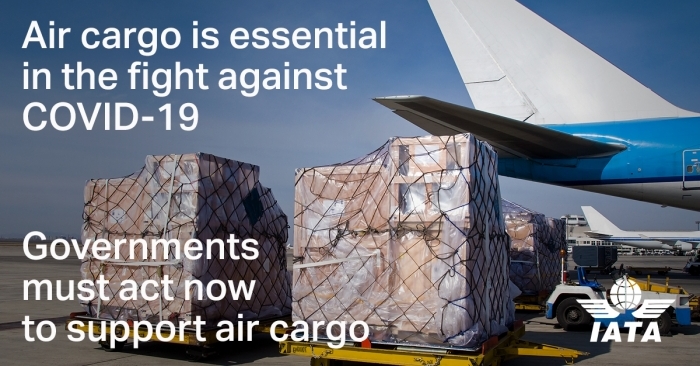Coronavirus: IATA urges govts to ensure air cargo capacity to fight outbreak
March 18, 2020: International Air Transport Association (IATA) urged governments to take urgent measures to ensure that air cargo will be available to support the global fight against COVID-19.

March 18, 2020: International Air Transport Association (IATA) urged governments to take urgent measures to ensure that air cargo will be available to support the global fight against COVID-19.
Air cargo is also instrumental in transporting food and other products purchased online in support of quarantine and social distancing policies implemented by states. The dramatic travel restrictions and the collapse of passenger demand have severely limited cargo capacity.
IATA’s suggestions to the governments include:
• Exclude air cargo operations from any COVID-19-related travel restrictions, to ensure life-saving medical products can be transported without disruptions
• Ensure that standardized measures are in place so that air cargo can continue to move around the world with minimal disruptions
• Exempt air cargo crew members, who do not interact with the public, from 14-day quarantine requirements
• Support temporary traffic rights for cargo operations where restrictions may apply
• Remove economic impediments, such as overfly charges, parking fees, and slot restrictions to support air cargo operations during these unprecedented times.
#Aircargo is vital in the global fight against #COVID19
— IATA (@IATA) March 16, 2020
185,000 pax flights have been cancelled since Jan. Vital cargo capacity has disappeared. Governments must take urgent action to facilitate air freight. Keeping cargo flowing save lives. #aviation https://t.co/ezavjI5Sgy pic.twitter.com/cXmDhSP4UT
Alexandre de Juniac, director general and CEO said “The measures that governments have introduced to restrict travel are shrinking the size of passenger operations. That is also removing significant cargo capacity from the system—capacity that is vitally needed to help keep supply chains going, including the delivery of critical medicines and medical equipment.”
“That includes exempting crew—who do not interact with the public—from quarantine, granting temporary traffic rights where needed, keep air cargo excluded from travel restrictions….and other practical measures to keep cargo moving at this critical time,” he added.
“IATA and its members continue to support governments in their efforts to contain the spread of COVID-19. Since the crisis began, air cargo has been a vital partner in delivering much-needed medicines, medical equipment (including spare parts/repair components), and in keeping global supply chains functioning for the most time-sensitive materials. This has been done through dedicated cargo freighter operations, utilization of cargo capacity in passenger aircraft and with relief flights to affected areas,” says the release.
“Over 185,000 passenger flights have been cancelled since the end of January in response to government travel restrictions. With this, vital cargo capacity has disappeared when it is most urgently needed in the fight against COVID-19. The world’s fleet of freighter aircraft has been mobilized to make up this capacity shortfall. Governments must take urgent measures to ensure that vital supply lines remain open, efficient and effective,” said de Juniac.
“Air cargo carriers are working closely with governments and health organizations around the world to safeguard public health while also keeping the global economy moving. Today, as we fight a global health war against COVID-19, governments must take urgent action to facilitate air cargo. Keeping cargo flowing will save lives,” he added.
In normal times, airlines transport about 35 percent of global trade. And every job in air transport supports another 24 in the travel and tourism value chain—nearly 70 million jobs. Prioritizing air transport—helping airlines financially survive through these dark times—will position the world for the eventual recovery.



